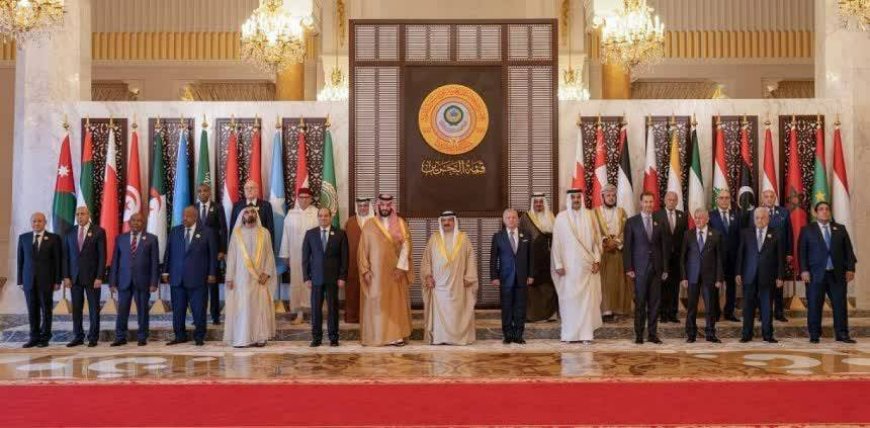Arab Summit: A Comedy Show Amidst Israeli Massacre in Gaza

By: M.S. Qorbani
The 33rd Arab summit in Manama, Bahrain, concluded with a sense of disappointment as Arab leaders failed to take concrete action to address the ongoing Israeli aggression in Gaza. Despite high expectations, the summit ended without any meaningful steps to support the Palestinian people or hold the Israeli regime accountable for its war crimes.
The final statement emanating from this gathering highlighted a series of pivotal points, ostensibly underscoring the urgent imperative to halt the belligerence of the occupying Israeli forces in Gaza and effectuate a complete withdrawal from the region. Among the salient directives articulated in the statement were the fervent call for the deployment of international peacekeeping forces to oversee the realization of a two-state solution, the unequivocal denunciation of Israel's invasion of the Rafah crossing, and a staunch opposition to any coercive attempts at relocating the Palestinian population.
Furthermore, the statement resounded with a resolute emphasis on the imperative for Israel to vacate the Rafah enclave and facilitate the unimpeded delivery of humanitarian aid to the beleaguered denizens of Gaza. It also underscored the pivotal role of the Security Council in steering the implementation of the two-state solution and implored all Palestinian factions to unite under the umbrella of the Palestine Liberation Organization (PLO).
The overarching sentiment conveyed in the statement beseeched the international community to honor its obligations in advancing the peace process, culminating in a just and comprehensive resolution predicated on the establishment of an independent Palestinian state, with East Jerusalem as its revered capital, within the pre-June 4, 1967 borders—a vision enshrined in international resolutions and sanctioned authorities.
Regrettably, the aftermath of the Manama meeting painted a stark picture of missed opportunities and unfulfilled promises, particularly in addressing the acute plight of the Palestinian populace, most notably the resilient denizens of Gaza. The aspirations of the Arab and Islamic nations for a decisive stance against the Zionist transgressions remained largely unheeded, as the summit concluded without enacting substantive strategies to confront the ongoing atrocities perpetrated against defenseless civilians.
The conspicuous absence of robust strategic initiatives to alleviate the sufferings of the Palestinian people, notably those enduring the crucible of Gaza, underscored a disheartening inertia within the Arab leadership, signaling a profound incapacity to effect meaningful change in the prevailing political and humanitarian landscape. Notably, certain Arab nations, spearheaded by the United Arab Emirates, emerged as pivotal actors in thwarting the efficacy of the summit, casting a shadow of doubt upon the collective resolve of the Arab bloc.
The geopolitical landscape further unraveled with revelations regarding the UAE's conditional stance towards participating in the reconstruction efforts in Gaza post-conflict. A stringent prerequisite articulated by the UAE mandated the formation of a unified Palestinian government overseeing both Gaza and the West Bank, a stipulation deemed contentious by many observers for its perceived encroachment upon Palestinian sovereignty and self-determination.
This proclivity of the UAE to align its policies with the interests of the occupying regime in Tel Aviv, particularly amidst the recent escalations and carnage inflicted upon Gaza, has elicited widespread consternation and condemnation. The UAE's disgracful commitment to the Abraham Accords and support for the Israeli regime, even in the face of egregious massacres and ethnic cleansing in Gaza, stands as a testament to its prioritization of regional stability over the fundamental rights and aspirations of the Palestinian civilians.
The ramifications of the UAE's alignment with Israel reverberate across the region, casting a pall over the prospects for genuine peace and stability. The normalization agreements, purportedly heralded as harbingers of prosperity and security, have instead emboldened the Israeli regime in its expansionist endeavors, exacerbating the plight of the Palestinians and undermining regional equilibrium.
Amidst the backdrop of escalating atrocities and mounting casualties in Gaza, the UAE's strategic pact with Israel to counter Yemen’s Ansarullah Movement and facilitate logistical support underscores a disconcerting trend of prioritizing narrow geopolitical interests over humanitarian imperatives. The symbiotic relationship between the UAE and Israel, underscored by military and intelligence coordination, poses a grave challenge to the aspirations of peace and justice in the region.
In conclusion, the actions and alliances forged by the rulers of Arab countries, particularly the United Arab Emirates, underscore a disconcerting narrative wherein the Palestinian cause is cynically leveraged as a bargaining chip to advance narrow self-interests. As the region grapples with the specter of conflict and instability, the imperative for genuine solidarity and principled action in support of the Palestinian people grows ever more urgent, transcending geopolitical calculations and vested interests.













































